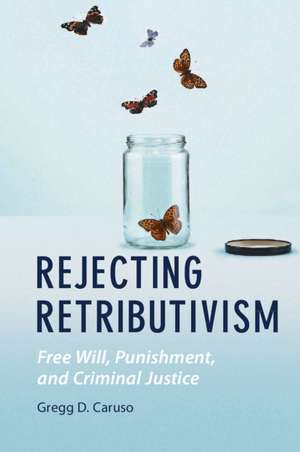Rejecting Retributivism: Free Will, Punishment, and Criminal Justice: Law and the Cognitive Sciences
Autor Gregg D. Carusoen Limba Engleză Paperback – 29 sep 2021
| Toate formatele și edițiile | Preț | Express |
|---|---|---|
| Paperback (1) | 289.62 lei 6-8 săpt. | |
| Cambridge University Press – 29 sep 2021 | 289.62 lei 6-8 săpt. | |
| Hardback (1) | 731.38 lei 6-8 săpt. | |
| Cambridge University Press – 28 apr 2021 | 731.38 lei 6-8 săpt. |
Preț: 289.62 lei
Nou
Puncte Express: 434
Preț estimativ în valută:
55.42€ • 58.02$ • 45.86£
55.42€ • 58.02$ • 45.86£
Carte tipărită la comandă
Livrare economică 05-19 aprilie
Preluare comenzi: 021 569.72.76
Specificații
ISBN-13: 9781108723480
ISBN-10: 1108723489
Pagini: 399
Dimensiuni: 152 x 229 x 21 mm
Greutate: 0.53 kg
Editura: Cambridge University Press
Colecția Cambridge University Press
Seria Law and the Cognitive Sciences
Locul publicării:New York, United States
ISBN-10: 1108723489
Pagini: 399
Dimensiuni: 152 x 229 x 21 mm
Greutate: 0.53 kg
Editura: Cambridge University Press
Colecția Cambridge University Press
Seria Law and the Cognitive Sciences
Locul publicării:New York, United States
Cuprins
Acknowledgments; 1. Free will, legal punishment, and retributivism; 2. Free will skepticism: hard incompatibilism and hard luck; 3. The epistemic argument against retributivism; 4. Additional reasons for rejecting retributivism; 5. Consequentialist, educational, and mixed theories of punishment; 6. Public health-quarantine model I: a non-retributive approach to criminal behavior; 7. Public health-quarantine model II: the social determinants of health & criminal behavior; 8. Public health-quarantine model iii: human dignity, victims' rights, rehabilitation, and preemptive incapacitation; 9. Public health-quarantine model IV: funishment, deterrence, evidentiary standards, and indefinite detention; References; Index.
Recenzii
'Caruso mounts a series of robust challenges not just to retributivism (his main target) but also to other recent attempts to provide justifying rationalisations of the institution of criminal punishment: the most striking and original of these are the metaphysical and epistemological challenges that he grounds in scepticism about free will and desert. He then develops, in impressive and empirically informed detail, an alternative, 'public health-quarantine' model of crime prevention, grounded in part on the right of self-defence. This aims not only to provide more humanely effective ways of preventing crime, but also to serve the aims of social justice, and to ensure a proper respect for the interests and the dignity of offenders. Those who want to defend the practice of criminal punishment will need to meet Caruso's challenges, while those who wonder whether and how we could do without this practice will find imaginative food for thought in his proposals.' Antony Duff, University of Minnesota
'The question for anyone skeptical, as I am, about the possibility of free will is whether there is a morally acceptable alternative to retributive punishment. Caruso's Rejecting Retributivism takes the 'quarantine' approach … and provides its first full statement and defense. The proposal is to understand crime control as a public health measure, justified as a form of self-defense and defense of others and limited by a capabilities approach to autonomy. It is a first rate study of the problem and the solution, and I recommend it to anyone concerned about the future of criminal justice.' Michael Corrado, University of North Carolina, Chapel Hill
'In this compelling and thoroughly researched book, Caruso proposes an account for the treatment of criminals that opposes the two most widespread justifications for criminal punishment, retributivism and general deterrence theory. In their place, he proposes incapacitation justified by the right to self-defense and defense of others. Caruso embeds this account within a public health model, which shifts the focus of criminology to identifying and addressing the social determinants of crime. Caruso's proposal, if implemented, would thoroughly reform the criminal justice system as it exists in many jurisdictions today. A truly impressive achievement.' Derk Pereboom, Cornell University
'… Caruso's model challenges us to rethink, from top to bottom, our assumptions about who we fundamentally are, our conceptions of justice, and the justifications for punishment. He's marshalled an impressive array of arguments and evidence to expand the options for criminal justice reform from a progressive, naturalistic perspective.' Tom Clark, Naturalism
'The question for anyone skeptical, as I am, about the possibility of free will is whether there is a morally acceptable alternative to retributive punishment. Caruso's Rejecting Retributivism takes the 'quarantine' approach … and provides its first full statement and defense. The proposal is to understand crime control as a public health measure, justified as a form of self-defense and defense of others and limited by a capabilities approach to autonomy. It is a first rate study of the problem and the solution, and I recommend it to anyone concerned about the future of criminal justice.' Michael Corrado, University of North Carolina, Chapel Hill
'In this compelling and thoroughly researched book, Caruso proposes an account for the treatment of criminals that opposes the two most widespread justifications for criminal punishment, retributivism and general deterrence theory. In their place, he proposes incapacitation justified by the right to self-defense and defense of others. Caruso embeds this account within a public health model, which shifts the focus of criminology to identifying and addressing the social determinants of crime. Caruso's proposal, if implemented, would thoroughly reform the criminal justice system as it exists in many jurisdictions today. A truly impressive achievement.' Derk Pereboom, Cornell University
'… Caruso's model challenges us to rethink, from top to bottom, our assumptions about who we fundamentally are, our conceptions of justice, and the justifications for punishment. He's marshalled an impressive array of arguments and evidence to expand the options for criminal justice reform from a progressive, naturalistic perspective.' Tom Clark, Naturalism
Notă biografică
Descriere
Caruso argues against retributivism and develops an alternative for addressing criminal behavior that is ethically defensible and practical.



